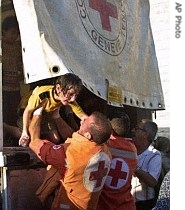-
(单词翻译:双击或拖选)
By Challiss McDonough
Tyre, Lebanon
08 August 2006
Vehicle traffic in southern Lebanon has come to a virtual standstill after the Israeli military warned residents that every single car on the road will be considered a target. Ambulances are no longer leaving the southern port city of Tyre to evacuate1 wounded people from surrounding villages. The president of the International Committee of the Red Cross (ICRC) has visited southern Lebanon and is warning both sides in the conflict that international law requires them to protect civilian2 lives.
---------
 A Lebanese Red Cross rescuer helps a Lebanese little girl get off a ICRC truck in the town of Marjayoun, southern Lebanon |
||
LEBANON RESIDENT READING LEAFLET: "Therefore, every car of any type that is moving south of the Litani River will be struck since it will be considered suspect, suspect in the movement of rockets, munitions3 and terrorists. You are hereby instructed and [have] been notified that your movement in any vehicle will be a serious threat to your life."
That warning has been taken very seriously. The streets are all, but abandoned.
Lebanese Red Cross and Civil Defense4 ambulances are still moving around to some extent within the city of Tyre, but they are not leaving town. Medics said they were in telephone contact with wounded people trapped under a bombed building in a nearby village but could not reach them.
The president of the International Committee of the Red Cross (ICRC), Jakob Kellenberger, said warning people to stay inside does not absolve5 Israel of its responsibilities to differentiate6 between civilian and military targets.
"You are, by letting down leaflets, you get not rid of your responsibilities under international humanitarian7 law," he said. "So if you are distributing leaflets, that does not mean you are not bound anymore by the pertinent8 rules of international humanitarian law."
In a sometimes raucous9 news conference in Tyre, a paramedic from the local rescue squad10 practically pleaded with the ICRC chief for help in convincing the Israelis to let ambulances move freely.
Kellenberger said he would be reminding both sides in the conflict of what he called the "basic rules of international humanitarian law, especially the rules concerning the conduct of hostilities11."
"That there is a distinction between civilians12 and combatants. It is a distinction between civilian objects and military objectives. It's a rule of precautionary measures that must be taken by both sides, by those that attack and by those who are being attacked," he added. "And it is a principle of proportionality. And you can be sure that I have already discussed this issue at one place, and I will certainly discuss this issue at the right places."
To get to Tyre, the ICRC president had to walk across the Litani River balancing on a tree trunk. The last bridge over the river was cut by an Israeli airstrike on Monday, and south Lebanon has been essentially13 cut off from the rest of the country since then.
But Kellenberger said his first priority is reaching the surrounding villages that are even more isolated14 and more besieged15 than Tyre.
"In terms of priority, for me, by far the largest priority is to have access as quickly as possible in the south of Lebanon to all places where we have not yet had access. Because people can't wait," he explained.
He said "access" means the evacuation of civilians, especially the wounded, from the conflict zone, as well as getting food, water and medical supplies to the isolated villages. He said the ICRC was able to evacuate about 200 civilians from two villages near the border on Tuesday, but has been unable to get to most of the rest of the border region.
He said the current estimate is that 100,000 people are still trapped in southern Lebanon.
The Red Cross president has already met with Lebanese officials and travels next to Israel.
 收听单词发音
收听单词发音
1
evacuate

|
|
| v.遣送;搬空;抽出;排泄;大(小)便 | |
参考例句: |
|
|
|
2
civilian

|
|
| adj.平民的,民用的,民众的 | |
参考例句: |
|
|
|
3
munitions

|
|
| n.军火,弹药;v.供应…军需品 | |
参考例句: |
|
|
|
4
defense

|
|
| n.防御,保卫;[pl.]防务工事;辩护,答辩 | |
参考例句: |
|
|
|
5
absolve

|
|
| v.赦免,解除(责任等) | |
参考例句: |
|
|
|
6
differentiate

|
|
| vi.(between)区分;vt.区别;使不同 | |
参考例句: |
|
|
|
7
humanitarian

|
|
| n.人道主义者,博爱者,基督凡人论者 | |
参考例句: |
|
|
|
8
pertinent

|
|
| adj.恰当的;贴切的;中肯的;有关的;相干的 | |
参考例句: |
|
|
|
9
raucous

|
|
| adj.(声音)沙哑的,粗糙的 | |
参考例句: |
|
|
|
10
squad

|
|
| n.班,小队,小团体;vt.把…编成班或小组 | |
参考例句: |
|
|
|
11
hostilities

|
|
| n.战争;敌意(hostility的复数);敌对状态;战事 | |
参考例句: |
|
|
|
12
civilians

|
|
| 平民,百姓( civilian的名词复数 ); 老百姓 | |
参考例句: |
|
|
|
13
essentially

|
|
| adv.本质上,实质上,基本上 | |
参考例句: |
|
|
|
14
isolated

|
|
| adj.与世隔绝的 | |
参考例句: |
|
|
|
15
besieged

|
|
| 包围,围困,围攻( besiege的过去式和过去分词 ) | |
参考例句: |
|
|
|















